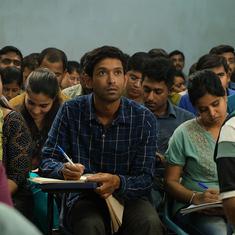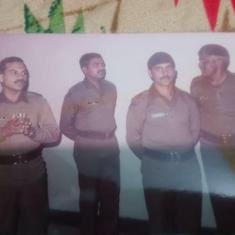It isn't easy to gauge the impact Congress Vice President Rahul Gandhi’s strong pitch for a farm loan waiver has generated in Uttar Pradesh, where Assembly elections are due early next year. But it has already sent the Rashtriya Swayamsevak Sangh into a tizzy. Fearing an erosion of its base in rural areas, it has asked the Bharatiya Janata Party to include some concrete promises in its poll manifesto to stop the state’s farmers from leaving the Sangh fold.
The issue was discussed in detail by senior office-bearers of the RSS at a conclave in Hyderabad last week, said a functionary who was privy to the deliberation. “Rahul Gandhi’s attempt to wean away farmers and the BJP’s inability to counter the move were seen as an issue of major concern by the Sangh,” he said.
BJP President Amit Shah also attended the three-day conclave that ended on October 25.
The official added, “On October 24, the all-India functionaries of the RSS had a separate meeting with Amit Shah, who was asked to include some concrete promises for farmers in the party’s election manifesto for UP.”
The BJP’s ideological parent suggested two measures in particular: the formation of a corpus to ensure the timely payment of dues to sugarcane farmers in the state, and a promise of some kind of loan waiver to offset Gandhi’s campaign.
Sugarcane farmers in Uttar Pradesh have been demanding a revision in prices for their produce for some time now, even as crop failure and mounting debt continue to stalk large parts of the state, especially the drought-hit Bundelkhand region.
Sounding out BJP
During Rahul Gandhi’s month-long Deoria-to-Delhi Kisan Yatra that ended on October 6, the Congress had, as part of its big push in Uttar Pradesh, promised a farm loan waiver within 10 days of coming to power, the halving of electricity bills and an enhanced support price for crops. The promises were based on the Kisan Mang Patra (farmer’s memorandum) that party workers had collected from a large number of farmers – the target was two crore households.
So far, the BJP has been dismissive of Gandhi’s yatra and the Kisan Mang Patra drive, even as the Congress pins its hopes on these measures to revive its fortunes in the electorally crucial state, where it has been in political wilderness for nearly three decades.
Addressing a poll rally in Mahoba on October 24, Prime Minister Narendra Modi did not dwell much on the farm crisis, focusing instead on his government’s efforts to end the practice of triple talaq and urging the state to break the cycle of Samajwadi Party and Bahujan Samaj Party rule to become “Uttam Pradesh”.
In the elections next year, the BJP hopes to repeat its performance in the 2014 general elections when it had won 72 of the 80 Lok Sabha seats in Uttar Pradesh. The party was till then perceived to be an urban-centric outfit enjoying the support of traders, businessmen and upper castes. That perception was demolished in 2014 when it got massive traction in the state’s rural areas and won a large chunk of the votes of Other Backward Classes and Dalits.
The RSS, too, quickly expanded its network in the rural areas of the Hindi belt, particularly in Uttar Pradesh.
But even before the organisation consolidates its gains of the last two years, it’s political outfit is facing the challenge of the upcoming Assembly elections.
“The area is new and we haven’t got enough time to consolidate,” said the RSS functionary. “The fall of the BJP in UP’s villages would be disastrous for the Sangh too. Convictions change as circumstances change.”










